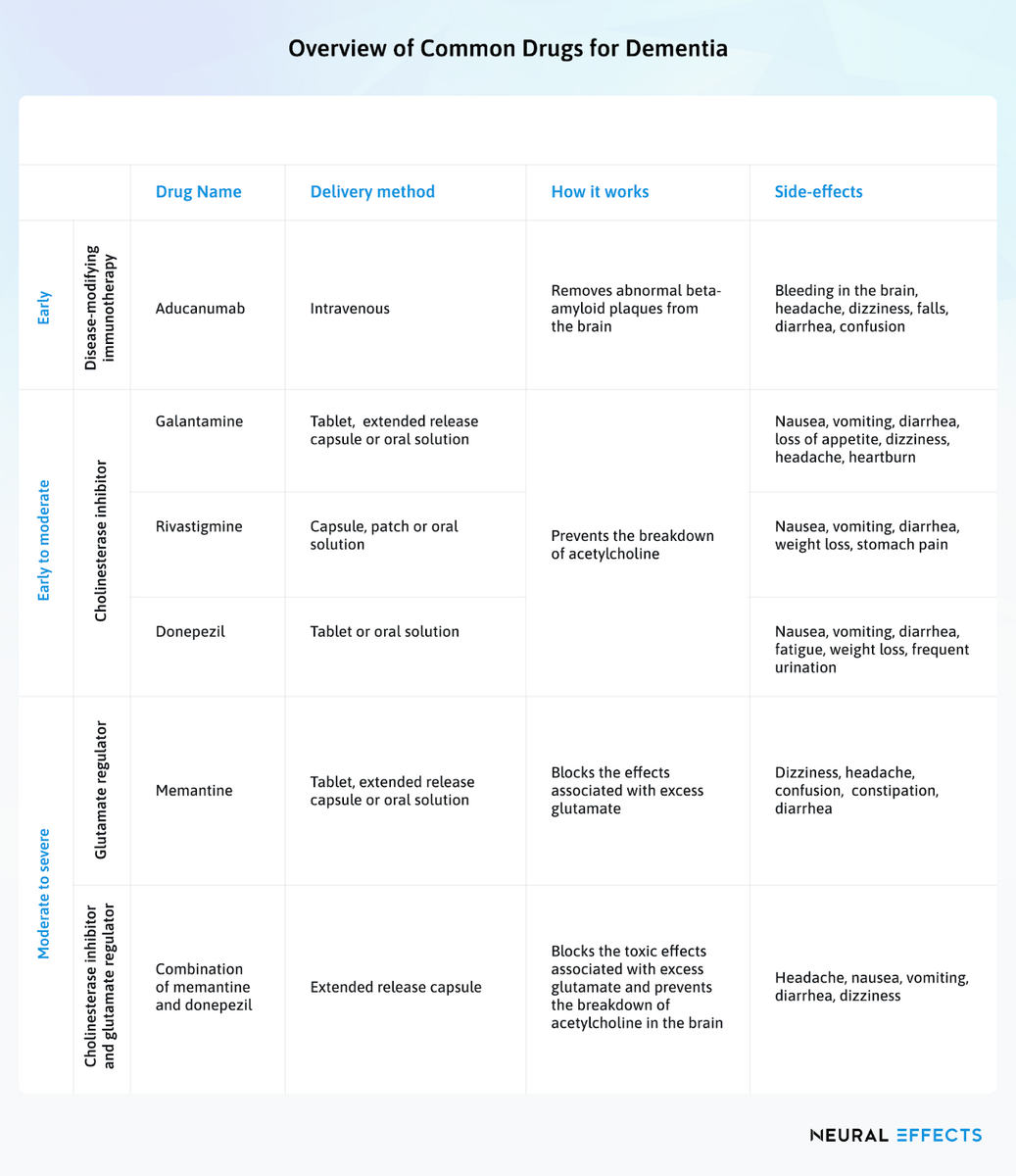At the moment, there is no cure for dementia. Dementia treatment focuses on ways to slow down the progression of the disease and ease some of the symptoms. The aim is to help patients maintain their quality of life, maximize their ability to participate in activities of daily living (ADLs), improve mood and behavior, and promote social engagement.
There are many different treatment options for dementia patients — some of which we’ll cover in this article — which can help with managing specific symptoms. However, patients should consider a holistic approach to managing the disease, including both therapy and lifestyle changes. For some patients, dementia drugs may also help for a while, but their effect is limited and they may not be appropriate for every patient.
At Neural Effects, we offer a curated selection of therapies to address physical, cognitive, and emotional symptoms. We advise and equip our patients to follow a healthy lifestyle, including engaging in exercise, eating a balanced diet, and continuing to challenge the brain. Multiple studies show that this comprehensive approach is the most effective way to delay disease progression and allow patients to live independently for longer.
In this post, we explain your dementia treatment options:
- Nonpharmacological therapies to address emotional, cognitive, physical, and social symptoms
- Combining therapy with exercise
- Lifestyle changes that can slow down dementia progression
- Pharmacological treatment options
Neural Effects uses the latest evidence-based techniques to diagnose and help dementia patients. We are located in Provo, Utah and serve anyone in Salt Lake City or the Utah Valley area. We are in network for most types of medical insurance. Schedule your evaluation today.
Nonpharmacological Treatments Can Slow Down Dementia Symptom Progression

The care of patients with dementia involves a broad range of therapies. While these therapies differ greatly in the methods used, they all have the same goal of improving the patient’s quality of life and delaying loss of cognitive function.
The choice of therapy is usually based on the patient’s preference, what stage of dementia they’re in, the type(s) of dementia they have, therapist availability, and cost. Some therapies are only available in a medical facility, such as nursing homes or adult daycare centers, while others can be done at home with no equipment. Look for healthcare options that can be done regularly (not just occasionally), as that will provide the most benefit to the patient.
Note: While we don’t discuss supplements in this post, you can find more information on them in our post on how to treat dementia naturally at home.
Therapies to Address Emotional Problems
This category includes therapies designed to help dementia patients deal with mental health and other emotional issues.
During talk therapy, for example, patients attend sessions with a counselor, a psychologist, or a psychiatrist to discuss their feelings and worries, including how they feel about their diagnosis. Certain types of talk therapy — such as cognitive behavioral therapy (CBT) — can help patients deal with symptoms of depression and anxiety. Talk therapy is more effective during the early stages of the disease. Late-stage patients with severe difficulties in terms of attention and communication may find it difficult to engage in this type of therapy.
Another example is reminiscence therapy, which helps patients remember events and experiences from their past. Studies show that reminiscence therapy can produce modest, short-lived improvements in mood, behavior, and cognition. Therapists use props, such as videos, music, pictures, and objects that hold a special meaning for the patient to stimulate memories. Even patients with severe dementia can still experience the pleasure of looking at old photos or listening to their favorite music.
Some patients — especially in the middle to late stages of the disease — respond well to validation therapy to help them cope with their emotions. There is no attempt to remind patients about the date or where they live. Instead, therapists talk to patients at their level. For example, if a 90-year-old patient is expecting her mother to come home, the therapist may ask gentle questions about her childhood instead of correcting the patient. Research results from this therapy are mixed. Some studies found that it can decrease agitation in patients, while others found no benefits.
Massage and aromatherapy can have a calming effect and help with behavior issues. Therapists can use different essential oils to reduce stress and promote well-being. For example, many patients find lavender, chamomile, and lemongrass relaxing. These services are not suitable for everyone. For example, it may not be the best option for patients who don’t like being touched or who have skin conditions such as psoriasis or eczema.
Therapies to Address Cognitive Problems
The aim of these treatments is to slow down the decline of cognitive function. Multiple studies show how these therapies can help with cognitive skills, improve behavior, and stimulate social interaction.
For example, during cognitive stimulation therapy (not to be confused with cognitive behavioral therapy), patients engage in multiple activities designed to help improve memory, problem-solving skills, and language skills. These activities may include discussions, puzzles, crosswords, listening to music, or engaging in arts and crafts projects. Clinical trials found significant benefits in memory and language skills such as naming, word finding, and reading comprehension. Patients also experienced a boost in confidence and psychological well-being.
Further reading: Memory therapy for dementia patients
Speech and language therapy can also address many of the cognitive and communication symptoms caused by dementia. This therapy can help patients who are experiencing communication and language problems, such as difficulty with attention and focus, voice and speech problems, and difficulty reading. Studies show that it can help dementia patients improve their understanding of spoken and written language, as well as in expressing their thoughts and ideas.
For patients with more advanced dementia, reality orientation training may be a good option to protect cognitive function. This therapy involves constantly repeating basic information, such as the patient’s name, where they live, and the date. After therapy, patients are more able to identify the date and time of day and also experience small improvements in cognition, function, behavior, and social interaction.
Therapies to Address Physical Problems

In addition to experiencing cognitive decline, dementia patients often also experience physical problems, such as balance problems, stiffness, and impaired movement.
Physical therapy (also called physiotherapy) is an ideal tool to help patients who are experiencing physical difficulties. The aim is to encourage physical activity and to help patients maintain their independence for as long as possible. Many studies show physical therapy is very beneficial for both cognitive and physical skills in patients with mild cognitive impairment (MCI) and dementia, including reducing the risk of falls, increasing muscle strength, and improving mood. As dementia progresses, physical therapists can adapt the therapy routine to accommodate the patient’s changing needs.
Further reading:
Dementia patients may also benefit from occupational therapy. Occupational therapists work with dementia patients to prolong how long they can live independently. Typically, these therapists can help by:
- Suggesting exercises to reduce the risk of falls.
- Modifying daily activities so they’re easier to perform.
- Planning a routine to provide structure.
- Recommending equipment such as mobility aids or support bars for the bathrooms.
- And more …
Further reading: Occupational therapy for dementia patients
In addition to affecting mobility, dementia can also lead to sleep disturbances. In this case, bright light therapy can be a beneficial treatment. This therapy improves the patient’s mood and communication skills while reducing anxiety and depression. Typically, a patient sits in front of a light box that provides about 30 times more light than the average light for a set amount of time. The aim is to reset the patient’s internal clock (known as the circadian rhythm), which can be disrupted in dementia patients.
Therapies to Stimulate Dementia Patients
These therapies focus on recreational stimulation via arts and crafts, pets, music, and more. There is some evidence that these interventions improve mood, decrease behavioral problems, and encourage social interactions.
One example is sensory stimulation therapy. This therapy is designed to help dementia patients remember positive emotions and memories by showing them everyday objects that mean something to them. You might bake their favorite cake (with them, if they’re able, or for them if not). Or you might give them a bouquet of their favorite flowers to smell and look at during the week. The aim is to make patients feel safe and relaxed while improving their mood, self-esteem, and well-being.
Patients with dementia may also enjoy being creative during art therapy, by sculpting, painting, drawing, making cards, or creating jewelry. Studies show that this form of therapy boosts cognitive function, enhances communication, and promotes social interaction for dementia patients.
Music therapy is another type of therapy that can be used with dementia patients. Patients can play a musical instrument, sing, or simply listen to music. Music therapy improves behavior problems, lowers anxiety, and controls agitation. For older adults with severe dementia, music may serve as a tool to help carers. For example, if the patient is agitated and struggling to get dressed, playing soothing music can help them calm down enough to accept help.
For animal lovers, pet therapy (also called animal-assisted therapy) may be the best option. Petting a cat or a dog helps control negative behaviors, such as agitation and aggression, and improves the patient’s mood. It can also be used to increase social interactions when done with support groups and to promote physical activity for patients who can still go out and play with an animal.
For patients with severe Alzheimer’s disease or other forms of dementia, doll therapy can be very useful. Some patients enjoy holding a doll or a small toy. This therapy not only improves communication and promotes social interaction, but also reduces the use of antipsychotic drugs, prevents wandering, and improves quality of life.
Combination of Therapy and Exercise

Often, therapies are administered one by one. Patients may engage in more than one type of therapy in the same timeframe (such as going to swim class on Mondays and also visiting an occupational therapist on Thursdays), but there may not be any communication between therapists.
At Neural Effects, we believe using a combination of therapies to achieve a common goal is much more effective for dementia patients, and that therapists should stay in communication with each other to better help the patient. This approach is supported by many scientific studies, with patients benefiting from completing cognitive therapy immediately after physical exercise.
Exercise triggers a phenomenon in the brain called post-exercise cognitive boost (PECB). In response to an increased heart rate from physical activity, the brain releases an important chemical called brain-derived neurotrophic factor (BDNF). This compound helps the brain become receptive to change, which means patients benefit more from therapy shortly after exercise.
Before treatment starts, all patients undergo a neuropsychological exam (also called a neurocognitive evaluation) to find out exactly how dementia has affected their cognitive skills. The exam includes tests to assess memory, attention, and other cognitive skills. Our therapists will also make a physical evaluation, which includes checking reflexes, eye movements, balance, and posture. Finally, our psychologist will perform a mental health evaluation to look for signs of anxiety, depression, or stress.
Once these exams are completed, patients (and their loved ones) will meet with a member of our team to discuss the best way forward. Our treatment involves a series of therapies, such as cognitive therapy, neuromuscular therapy, and occupational therapy, combined with short sessions of aerobic exercise.
Patients are encouraged to bring a family member or caregiver to their sessions to learn the exercises and help them at home. At the end of each session, our therapist will also give patients a series of exercises to do at home. Completing these exercises is a good way to boost the overall effect of therapy and delay the progression of the disease.
Neural Effects uses the latest evidence-based techniques in dementia diagnosis & treatment. We are located in Provo, Utah and serve anyone in Salt Lake City or the Utah Valley area. We are in network for most types of medical insurance. Schedule your evaluation today.
Making the Right Lifestyle Choices

Dementia patients should not rely exclusively on therapy to slow down cognitive decline. It’s important to make the right lifestyle choices at home to boost the impact of other treatments. These lifestyle choices are helpful for most types of dementia, including vascular dementia, frontotemporal dementia, Alzheimer’s disease, Lewy Body dementia, Parkinson’s disease dementia, mixed dementias, and more.
Engage in Regular Exercise
Studies show that one of the best things patients can do is to stay physically active. Exercise not only improves fitness and strength, but it also helps patients cope with cognitive symptoms such as memory loss or difficulty concentrating. Patients benefit the most from physical activity during the early stages of the disease, but it’s never too late to start.
Ideally, physical activity should include something that increases heart rate to promote blood flow to the brain, combined with some flexibility and balance exercises. We recommend that patients stay active for at least 30 minutes every day, five days a week. The activity doesn’t have to be all in one session; it can be divided into shorter periods during the day, with each session lasting a minimum of 10 minutes.
Challenge the Brain
Staying mentally active and challenging the brain is another recognized way to relieve the symptoms of dementia. The activity can be anything that patients enjoy doing without getting frustrated, from learning to play a new musical instrument to rekindling an old hobby, as long as it helps them think quickly, recall information, or make decisions.
Follow a Balanced Diet
Following a healthy and balanced diet can slow down the progression of the disease. One example is the MIND diet, which combines a traditional Mediterranean diet and the DASH diet (designed to lower high blood pressure). Studies show this diet can slow down brain decline equivalent to being 7.5 years younger.
The MIND diet favors eating vegetables, fruits, nuts, whole grains, low-fat dairy products, and lean protein foods, while avoiding salty, sugary, and fatty processed foods.
Keep Socially Active
Dementia patients who isolate themselves at home experience a faster cognitive decline and may develop anxiety and depression. The best way to avoid this is by staying socially active and in contact with loved ones. Patients may join an art club, volunteer at a local charity, or simply go out for a coffee with friends. Even just a regular chat over the phone can help those struggling with mobility issues.
Establish a Good Sleep Pattern
It’s common for dementia patients to experience sleep disturbances, such as difficulty falling asleep at night and feeling drowsy during the day. Some patients with dementia also experience a phenomenon in the evening called sundowning, where they feel confused, agitated, anxious, and aggressive as it gets dark.
It’s important to address these issues. First, we recommend that patients visit their family doctor to check for an underlying cause of sleep problems, including medical conditions like sleep apnea or side effects from medications. At home, patients need to follow a strict routine when going to bed. For example, patients may choose a relaxing activity such as listening to calming music in the evening or reading a book. They should also avoid alcohol, caffeinated drinks, and using screens late at night.
Pharmacological Treatments (Not Suitable for Every Patient)
Dementia is a challenging disease, and it is unlikely that any one drug will ever be successful in treating all patients living with the disease. Having said that, the U.S. Food and Drug Administration (FDA) has approved several prescription drugs to help manage symptoms in patients with dementia. Most medicines work better for patients in the early to middle stages of dementia, but it’s important to understand that even if patients start taking these drugs right after an early diagnosis, currently available medications are not a cure.
In addition, not all patients respond well to dementia drugs, and for some, the impact of side effects outweighs any positive outcomes. Whether or not dementia medications would interact with a patient’s medications for other health conditions is another factor to consider. Patients should discuss the pros and cons of available medications with their healthcare provider.
Treatment for Mild to Moderate Dementia
The most common drugs typically prescribed for dementia patients during the early and moderate stages are cholinesterase inhibitors called galantamine (brand name: Razadyne), rivastigmine (brand name: Exelon), and donepezil (brand name: Aricept). These drugs may help reduce or control some cognitive and behavioral symptoms.
Cholinesterase inhibitors work by preventing the breakdown of acetylcholine, a chemical present in the brain that is important for memory and thinking. Higher levels of acetylcholine may result in better communication between nerve cells so that patients experience improvements in memory, thinking, language, judgment, and decision-making.
However, as the disease progresses, the brain produces less acetylcholine, and these drugs eventually lose their effect. All cholinesterase inhibitors work in a similar way, which means switching from one brand to another is unlikely to produce different results. That said, some dementia patients may respond better to one drug versus another.
These drugs are generally well tolerated, but some patients complain of side effects such as nausea, vomiting, loss of appetite, and increased frequency of bowel movements.
In contrast to cholinesterase inhibitors — which were developed to control symptoms — the FDA has recently approved the first drug to treat dementia that can be classed as disease-modifying. In simple terms, aducanumab (brand name: Aduhelm) targets the protein beta-amyloid to eliminate amyloid plaques, which are brain lesions associated with the most common form of dementia, Alzheimer’s disease. The hope is that removing these plaques will stop the cognitive and functional decline experienced by patients.
Although clinical studies were only conducted in patients with early-stage Alzheimer’s or mild cognitive impairment, results show that this drug can decrease amyloid deposition. Unfortunately, these studies failed to demonstrate a link between removing amyloid plaques and any significant cognitive improvements. In addition, some patients experienced worrying side effects such as swelling and bleeding in the brain, headaches, dizziness, nausea, confusion, and vision changes. If you want to read more about the controversy surrounding aducanumab and why we have reservations about this drug, we’ve written in more detail about this issue in our article about how to help dementia patients.
Treatment for Moderate to Severe Dementia
As the disease progresses and symptoms get worse, doctors have fewer options to treat dementia patients. Patients with moderate to severe dementia may consider a glutamate regulator called memantine (brand name: Namenda). This drug works by regulating the activity of glutamate, a chemical in the brain. Too much glutamate may lead to brain cell death.
Memantine helps some patients maintain daily functions a little longer than they would without the medication. For example, it may help a patient with late-stage dementia maintain their ability to use the bathroom independently for longer.
As cholinesterase inhibitors and glutamate regulators use different mechanisms on the brain, the FDA has approved a combination medication of memantine and donepezil to treat Alzheimer’s disease in the mid- to late stage of the disease.
Possible side effects of memantine include headaches, nausea, vomiting, loss of appetite, constipation, increased frequency of bowel movements, confusion, and dizziness.
Treatment for Behavioral and Emotional Symptoms
Dementia patients may develop emotional and psychological symptoms such as agitation, aggression, anxiety, and even hallucinations. Treating these behavioral symptoms in an appropriate manner can make patients with dementia more comfortable and increase their quality of life. Although there are multiple drugs available to treat these symptoms — such as anti-anxiety drugs, antidepressants, and antipsychotics — it’s best to try other interventions before resorting to them because of the possible side effects and drug interactions.
If absolutely necessary, patients experiencing anxiety and depression may be prescribed anti-anxiety drugs. However, these drugs increase the risk of patients feeling dizzy and confused and should only be used for short periods of time. Similarly, antipsychotics can be used to treat cases of paranoia, agitation, and aggression. Because side effects include risk of death, antipsychotics should only be given to patients with severe symptoms.
Treatment for Sleep Disturbances
As mentioned earlier, dementia patients often experience sleep disturbances, which aggravates other symptoms and accelerates cognitive decline.
If non-pharmacological approaches are not enough, sleep aids can be useful to help patients get a good night’s sleep. However, it can be detrimental for dementia patients to use them on a regular basis. We advise our patients to consider taking melatonin since this supplement helps improve sleep and reduces sundowning in patients with dementia.
Neural Effects uses the latest evidence-based techniques to diagnose and help dementia patients. We are located in Provo, Utah and serve anyone in Salt Lake City or the Utah Valley area. We are in network for most types of medical insurance. Schedule your evaluation today.

